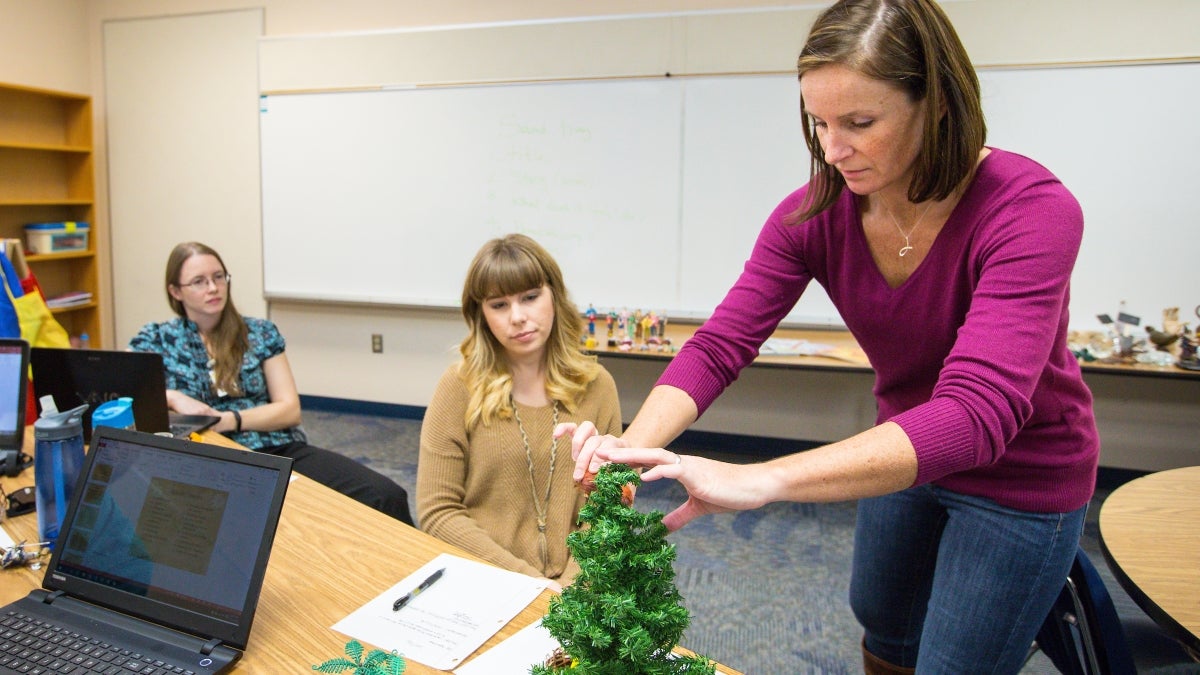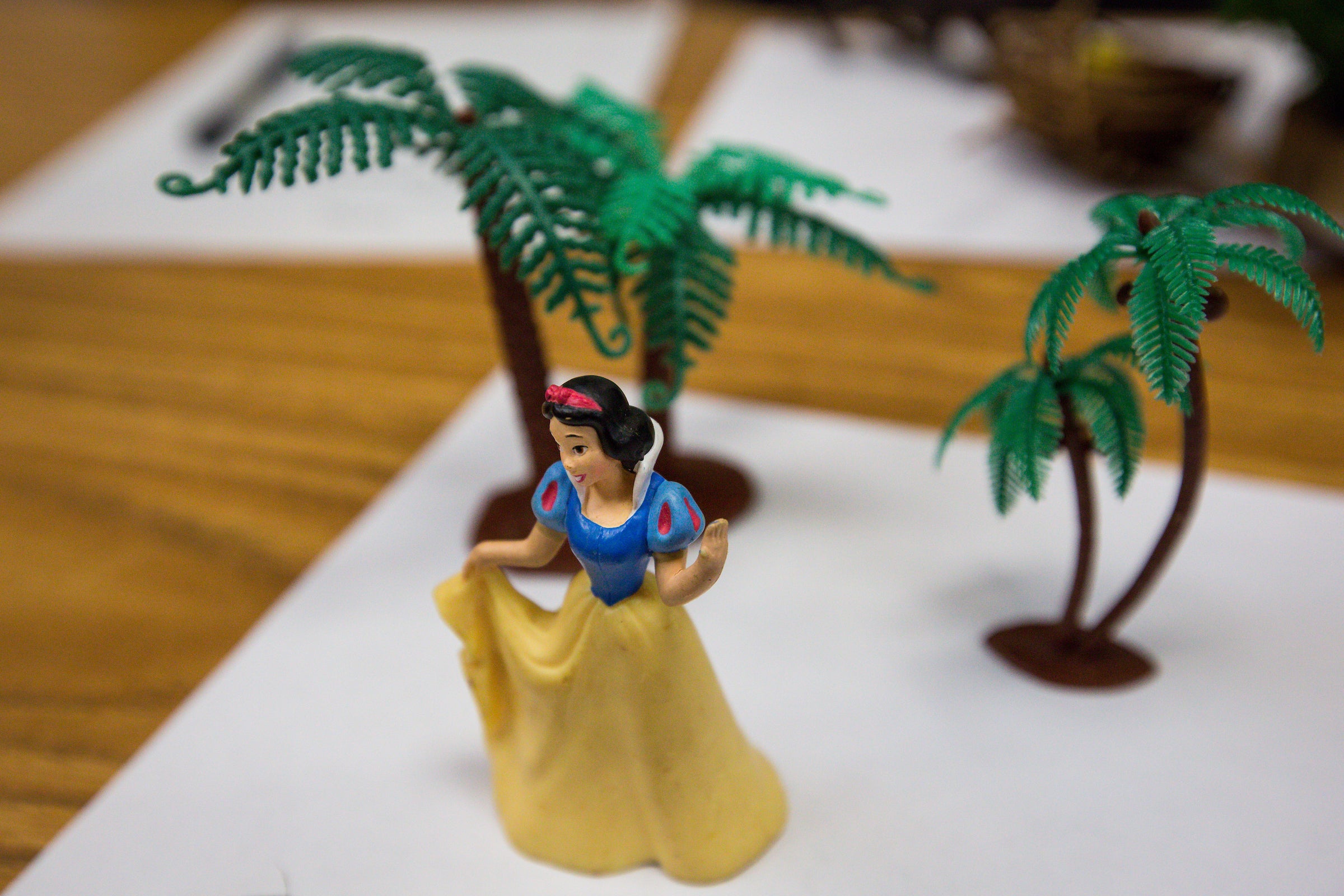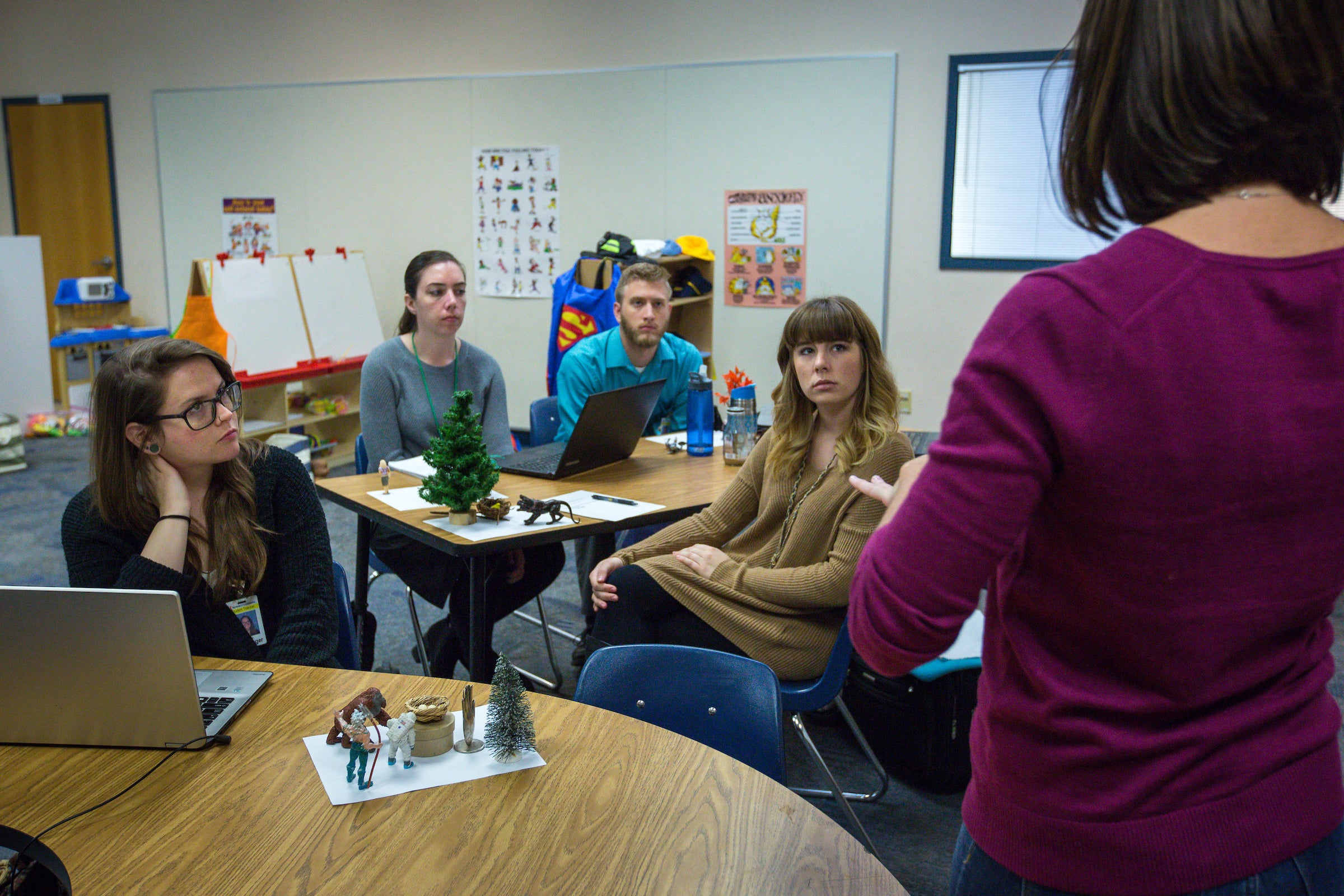The figurine of a bird in a nest looks like a little toy, but it’s also a powerful tool of expression for children who can’t talk about their worries.
“It’s called play therapy, but it’s very serious work for children,” said Jennifer Pereira, a clinical assistant professor in the Counseling and Counseling Psychology graduate programs in the College of Integrative Sciences and Arts at Arizona State University.
This semester, six ASU graduate students were part of a pilot program that embedded their “Introduction to Counseling Children” course in a Phoenix elementary school. The students learned how to utilize play therapy and a dozen young children were able to have free sessions, all under the supervision of Pereira.
Figurines are part of the play-therapy items found at Kyrene de los Cerritos Elementary School as part of an ASU pilot program for grad students who ar learning to be play therapists. Photo by Charlie Leight/ASU Now
Pereira decided that the counseling course would be more effective if the students could actually work with children.
“On campus, they’re role playing with each other versus working directly with kids,” she said. “I wanted to get them out into the community and practicing what they’re learning in real time.”
She started calling area schools and the administration at Kyrene de los Cerritos Elementary School in Phoenix jumped at the chance to have therapy sessions for a handful of students.
Principal Darcy DiCosmo said that a non-profit group used to provide support for students who had social and behavioral issues that was paid through tax credits, but those funds have dwindled and the service ended.
“We recognize that kids need social assistance more than we’ve ever seen before, such as learning how to like themselves and how to step into unknown situations and be confident and secure,” she said.
Cerritos gave Pereira and her students a classroom, and with funding from her department bought items that would be found in a play-therapy clinic — art supplies, dolls, dress-up clothing and figurines. Some toys are meant to help children safely express aggression, such as plastic swords, and others represent home life, including doll houses.
Play therapy is a structured, theoretically-based process that is used with children between the ages of 2 and 9. The kids use play to confront problems and find solutions.
“We allow the child to have space and to play out the issues they’re experiencing,” Pereira said.
“The trained therapist understands the themes and patterns in play, and the things they’re doing as the pieces of life that are distressing and concerning to them.”
The ASU students visited the school once a week, spending the first 90 minutes on coursework with Pereira and then working with the kindergarteners, first- and second-graders for half an hour. The children were selected by school staff.
During a recent class, the grad students discussed the therapeutic uses of sand trays, in which children create scenes with figurines in a tray filled with sand.
Students in ASU's Introduction to Counseling Children course were embedded at Kyrene de los Cerritos Elementary School, where they worked with children in play-therapy sessions. Photo by Charlie Leight/ASU Now
“You can say, ‘Show me what it’s like to live at Grandma and Grandpa’s’ or ‘What does the tree say to the bird in a nest?’ " Pereira told them. “Ask them, ‘Are you in here?’ Are they active or just watching, if you think about kids in a domestic violence situation.”
ASU grad student Kris Mastin said it was exciting to see his young clients make progress over the semester.
“We started with child-centered play therapy, letting them take control and getting used to not actively directing the child. I tried to understand what they were showing me, and I tried to interpret,” Mastin said.
“I had one child who was very timid at the beginning, and by the end of the last session he was having a great time without having to ask for permission or check to make sure it was OK,” he said.
The grad students also created modules to teach all the children on topics such as how to be a good friend and how to deal with bullying.
Pereira will have 12 ASU students in the spring semester cohortThe counseling program has another clinical project — the long-running Counselor Training Center, a community clinic on the Tempe campus in which graduate students provide low-cost counseling services while working with faculty who are licensed psychologists., and they will work with 24 Cerritos pupils, including the ones from the fall program. She’ll also start collecting data next term, with teachers filling out questionnaires on how the children are doing with emotions and behavior as a result of being in the program. She hopes to expand the program to include an advanced class.
Some of the graduates from the program will go on to become certified play therapists and others will go into general private practice.
“One of the neat things about the training in child therapy," Pereira said, "is that it doesn’t matter your area of interest, because in this field, you will end up working with children.”
Top photo: Jennifer Pereira, a clinical assistant professor in the counseling and counseling psychology graduate programs in the College of Integrative Sciences and Arts, launched a pilot program that had master's students working with children at Kyrene de los Cerritos Elementary School in Phoenix. Photo by Charlie Leight/ASU Now.
More Arts, humanities and education

March Mammal Madness hypes science, storytelling in the classroom and beyond
In classrooms throughout the country, the buzz around March Mammal Madness starts long before the tournament begins. For middle school science teacher Jessica Harris, students wonder which…

Different ways of thinking, different ways of thriving: How ASU is supporting students with autism
According to the CDC, over 5.4 million adults in the U.S. are living with autism spectrum disorder, a condition that affects how individuals interact with others, learn and process information.…

Forever sewn in history
The historical significance of Black influence on fashion spans centuries. From the prints and styles of Africa to various American political climates, Black fashion has sealed its impact on the…


